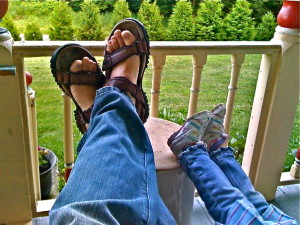Your Biography and Your Child
Vicki Kirsch – Stargarden Talk – 2-22-09 – Your Biography and Your Child
Vicki Kirsch – Stargarden Talk – 2-22-09 – Your Biography and Your Child
Vicki Kirsch – Stargarden Talk – 1-17-09 Health and Well Being for You and Your Child
Today was my first day as a parent at Stargarden’s Parent Child Class with Miss Vicki. Although we arrived late, due to my daughter’s morning nap, we still made it in time for morning circle, snack, story and free play outside with the other little friends and their parents. My first observations of the program include:
The Environment
Singing
Storytelling
A Gem
Elizabeth Uhrich, Director
To Promote Good Sound Sleep for Your Child:
Things Which Act Against Good Sound Sleep:
 Elementals are the Beings that play the role of participating in the actual manifestation of material reality under the direction, guidance and inspiration of Higher Beings. They sacrifice themselves to this challenging role for the sake of the human being that we may have a stage upon which to grow and evolve. Their nature is such that they imitate the qualities, thinking and especially feelings of the humans that are in their environment. For this reason, we can affect the environments we live in and that we create, including our homes, yards, towns, states, countries, and world. The following are positive actions that we can take to create a positive and healthy environment and sacred space.
Elementals are the Beings that play the role of participating in the actual manifestation of material reality under the direction, guidance and inspiration of Higher Beings. They sacrifice themselves to this challenging role for the sake of the human being that we may have a stage upon which to grow and evolve. Their nature is such that they imitate the qualities, thinking and especially feelings of the humans that are in their environment. For this reason, we can affect the environments we live in and that we create, including our homes, yards, towns, states, countries, and world. The following are positive actions that we can take to create a positive and healthy environment and sacred space.
 In observing young children one can see that they are attracted to movement with such keen enthusiasm that they cannot sit still, but must move and imitate what they have seen. In the “Pedagogical Value of the Knowledge of Man and the Cultural Value of Pedagogy” Rudolf Steiner shares that “the little child clings with his perceptions to gestures, movements, and motion before all else and that when he perceives any kind of motion he feels the inner urge to imitate it”. In this uninhibited mood they are lost in their surroundings with complete devotion, reverence and awe for what they experience.
In observing young children one can see that they are attracted to movement with such keen enthusiasm that they cannot sit still, but must move and imitate what they have seen. In the “Pedagogical Value of the Knowledge of Man and the Cultural Value of Pedagogy” Rudolf Steiner shares that “the little child clings with his perceptions to gestures, movements, and motion before all else and that when he perceives any kind of motion he feels the inner urge to imitate it”. In this uninhibited mood they are lost in their surroundings with complete devotion, reverence and awe for what they experience.
When the environment is such that the child can be surrounded with movement worthy of imitation, this innately religious devotion is cultivated. Unfortunately, the many handy devices of modern technology hardly provided opportunities for this native capacity. Instead it is helpful to use the more old fashioned devices, for example brooms, rakes, shovels, egg beaters, etc. which provide movement worthy of imitation. It is also most helpful for the child to see an adult who approaches their task with joy and enthusiasm. Daily tasks become inspirational as one realizes that the child can fully experience immersion in reverence and spiritual devotion to the task in the mood of the movement and activity and that this is an antidote to the modern mood of pessimism and sarcasm in adolescence. The child experiences movement as an innately religious experience. This can be cultivated by telling stories of fairies and gnomes or events of your life with gestures and movement imbued with meaning. Children love the movement and activity that fathers often provide.
These old fashioned tools also provide an antidote to the noise that modern devices make. In the formative years a child’s sensory system becomes overwhelmed by such noise. The ear’s capacity to hear becomes coarsened and the perception of the “Music of the Spheres” in the natural tones of birds, the wind, moving water, etc. are lost.A fixation on mechanical noises can develop with a hardening effect on the organs. A quiet time of blessing or prayer is helpful where the attitude and gesture of the reverent adult reveals their inner life and counteracts the coarsening tendency of modern sounds.
In Waldorf parenting and education attention to the subtle details of cultivating soul and spiritual values is emphasized. These experiences of religious devotion in the imitation of the environment and of reverence and awe deeply felt in simple events become a wellspring of vitality for their health and wellbeing in adulthood.
Knowing this you can create a daily rhythm which embraces the child being involved in simple household activities. For instance, when they are puttering about under your feet as you make breakfast, they could be exploring the nature of the material world. Thereby they are experiencing spirit in matter, a gift which they have brought with them
from their recent experiences before birth in the spiritual world. Eventually, they will be so inspired and interested in your activity that they will clamor to participate. At that stage find ways for them to “help”, such as cutting bananas with a butter knife or buttering the toast. They are not only learning the wisdom inherent in practical activities and perceptual and fine motor skills, but they are also learning the value of service to the family.
 While very young children may appear to use logic, their primary modes of learning are imitation and movement; that is the willing soul. Before you begin to speak begin the movement you wish them to imitate and make a general statement, not command, such as we are putting our shoes on now.” Better yet, sing it! This strengthens their willing soul. Young children respond more positively to statements, because questions illicit thinking, which is a part of the brain that needs the underpinning of sound movement skills to function more efficiently. Stories of similar situations from your childhood captivate children as they begin to form inner pictures of your words. Picture forming appeals to their sense of life.
While very young children may appear to use logic, their primary modes of learning are imitation and movement; that is the willing soul. Before you begin to speak begin the movement you wish them to imitate and make a general statement, not command, such as we are putting our shoes on now.” Better yet, sing it! This strengthens their willing soul. Young children respond more positively to statements, because questions illicit thinking, which is a part of the brain that needs the underpinning of sound movement skills to function more efficiently. Stories of similar situations from your childhood captivate children as they begin to form inner pictures of your words. Picture forming appeals to their sense of life.
Use gestures and begin the movement of putting on shoes as you tell the story. Appeal to your child’s imagination. If he/she likes trains, the engineer is putting on boots, because he/she has a big load to haul. Most choices should be made by the adult. For example: in the winter, spring shoes are put away and the child is offered the tall snow boots or the blue ones. When a child makes choices their life force is used for mental activity, rather than to grow a healthy body. Then their sense of well being suffers & cooperation becomes difficult. Create the activity ahead of time. The shoes, jackets, etc., can be set out the night before. The form carries the function. Doing these activities the same time every day will help. The organs become healthier, thus the child’s sense of well being is nurtured. They are more cooperative when they experience rhythm.
Your child is able to be cheerful and cooperative when they experience a bodily sense of well being. Think of yourself as the conductor. Children respond to a self confident parent by imitating confidence. Prepare yourself ahead of time by visualizing and planning how you will conduct the activity. Order, predictability and repetition cultivate confidence and well being. When your child feels a strong sense of life and self they will be more respectful. Allow and encourage your child to do all they can do for themselves, gradually increasing their skill. Song and verses, which portray what they are doing help. Mastery also builds confidence. Activities can become games, time for fun and laughter. How high can the shoes jump once they are on? Use humor, change the subject or sing when a child becomes fixated. This helps switch to a different brain center, which allows the focus to shift from them being stuck on what they don’t want to getting the shoes on.
Tips:
1. Practice self-development and self-discipline.
2. Develop observation, contemplation, and meditation skills to nurture your relationship to guiding Spiritual Beings. Observe your child (hair, eyes, features, limbs, color, movements, smells, sounds, for example.) The percepts that you notice become spiritual food for Angels and Higher Beings to give you intuition and inspiration about your child.
3. You are your child’s destiny guide, they are your teacher. What issues do they bring up from your childhood? What family patterns?
4. Practice presence of mind to be able to do what needs to be done. Presence models, ” I love you enough to be here in relationship to you.”
5. Allows your child to live in their stream of consciousness. Slow down.
6. Create rhythm that allows stream to flow.
7. Pay attention to the rhythms of sleeping and eating. These have a great and lasting effect on the child’s bodily constitution and sense of well being.
8. Allow for downtime and slow flow time, that allows family members to digest soul experiences. Hang out together doing nothing but enjoy each other.
9. Nurture awareness of imitation so that you do what they can appropriately imitate. Allow them to participate in your daily life of tending the hearth and home.
10. Do not do for them what they can do.
11. Be active with your child in daily chores, nature, games, tumbling, gardening, and care for the hearth and home. Allow them to participate in your life. For a portion of the day do in their presence what they can do with you. This fosters for the child a sense of meaning, belonging and purpose.
12. Cultivate the virtues of gratitude, wonder, awe and respect. This nurtures health and wellbeing and supports a mood of self discipline.
13. Pay attention to the environment which affects their physical organism in building their physical body. Simple and beautiful surroundings provide the most healthy influence. Limit technology and media.
14. Develop a strong visual imagination of your day with positivity, firmness and love. Nurture joy and happiness in simplicity. Review with yourself at the end of the day what did and did not work.
15. Visualize challenging situations with your children and how you will react in the future.
16. Consistency and predictability creates security. Use “No” 10% of the time and modeling and redirection the other 90% of the time. Realize that model imperative means that they will do what you do, not what you say, as they imitate who you are.
17. Cultivate good habits and a strong will in the early years through imitation, repetition, delay of gratification and not too many choices.
18. Use simple communication with phrases and gestures. Show and tell them what to do, and avoid dwelling on what not to do. Make statements and minimize questions and choices, which tend to be confusing to the consciousness of a young child. Their consciousness better relates to “ we” as they do not yet feel the awareness of separateness, of I and you. Stories have a deep effect on the child and reasoning is confusing. To cultivate reasonable children, model reasonable behavior that reflects well reasoned choices that are in alignment with your values and feelings.
19. Minimize adult activities such as movies, museums, lectures, concerts, tours, etc.
20. Examine your boundaries. Boundaries are an expression of how your higher Ego establishes values and integrates thinking, feeling and willing. Children need a firm, purposeful, kind and benevolent leader. They need a sense that you are in charge, the captain of the ship.
21. Children thrive in a flock where they can learn politeness, kindness, compassion, sharing, and helpfulness, harmonizing their will and tempering the self in relationship to others needs and desires.
22. Children can become challenging when they learn new skills. Time for you to evaluate your relationship with them.
23. At challenging times pick up clutter, clean, change the environment. Go outside with them.
24. Avoid bribery, such as if you do this then you will get…. Instead the carrot and motivation are more helpful, for example, I’m hungry. Let’s go get something to eat.”
25. Make a heart/physical connection daily and your child will cooperate more willingly. Use praise sparingly, but acknowledge and express gratitude for their help, thoughtfulness and abilities.
26. Remember, you are their destiny guide on earth and they bring important new spiritual capacities and insights from their recent sojourn in the spiritual world.
27. Hold the highest and best thoughts of your child and that is mainly what they will manifest.
Here’s a little free audio for you I recorded at a live Waldorf teacher workshop in March. Titled “Working With Boys“, this recording gives insight into the minds of boys and how parents and teachers can work with them to bring out the best in them. Total time for this audio is almost 3 hours…so take your time and enjoy.
Edit: The volume is a bit low, so you may need to turn your volume up a bit more than normal.